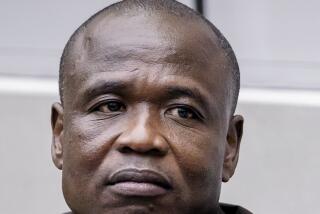‘Dark day:’ Hague prosecutors drop charges against Kenyan leader
War crimes prosecutors dropped “crimes against humanity” charges against Kenyan President Uhuru Kenyatta on Friday, conceding they had too little evidence to convict him of orchestrating post-election violence in 2007 that left at least 1,200 people dead.
In a statement issued from the International Criminal Court in The Hague, chief prosecutor Fatou Bensouda accused the Kenyan government of obstructing the investigation of Kenyatta and said she was reserving the right to file new charges if better evidence of his hand in the ethnic carnage can be obtained.
“Today is a dark day for international criminal justice,” Bensouda lamented. “Be that as it may, it is my firm belief that today’s decision is not the last word on justice and accountability for the crimes that were inflicted on the people of Kenya in 2007 and 2008, crimes that are still crying out for justice.”
Kenyatta, 53, had been charged with murder, rape, persecution, deportation and other criminal acts as an “indirect co-perpetrator” of the violence that followed the 2007 election.
“It has always been my position that the Kenyan cases at ICC were rushed there without proper investigation,” Kenyatta said in a statement issued by the presidential office. “I am also deeply relieved by this decision, which is overdue by six years.”
Rights advocates lamented the court’s decision to drop all charges and accused Kenyatta, who was elected president last year, of using his influence with the Kenyan government to derail investigators’ attempts to gather evidence against him.
“The victims’ quest for justice has been cruelly frustrated,” said Fergal Gaynor, a lawyer for 20,000 people whose relatives were killed or homes lost in the deadly melees that followed the political unrest between Kenyatta’s Kikuyu tribe and the ethnic Kalenjin of his then-rival William Ruto.
Kenyatta called on the court to drop charges against Ruto, a former education minister and supporter of then-candidate Raila Odinga who was indicted along with Kenyatta and two others for their roles in the post-election violence.
------------
FOR THE RECORD
This article has been corrected to delete an erroneous reference to William Ruto’s political allegiance.
3:25 p.m.: An earlier version of this story said Ruto was accused of orchestrating attacks on supporters of candidate Raila Odinga. The charges allege Ruto engaged gang members to attack supporters of then-President Mwai Kibaki.
------------
Human Rights Watch communications director Emma Daly said the court’s decision to drop charges against Kenyatta made it “clear that the tradition of impunity in Kenya and pressure on witnesses hampered fair process.”
The war crimes prosecutors’ failure to bring a credible case against Kenyatta was likely to further damage the reputation of the court, established 12 years ago to bring the world’s most heinous perpetrators to justice. To date, the court has ordered investigations of nine cases, all involving African leaders, and secured convictions of only two Congolese warlords.
Thirteen of the 20 suspects indicted for war crimes remain at large, including Sudanese President Omar Hassan Ahmed Bashir, accused of committing atrocities in his nation’s Darfur region, and Joseph Kony, leader of the Lord’s Resistance Army, a Ugandan militant group.
Follow @cjwilliamslat for the latest international news 24/7
More to Read
Start your day right
Sign up for Essential California for news, features and recommendations from the L.A. Times and beyond in your inbox six days a week.
You may occasionally receive promotional content from the Los Angeles Times.







